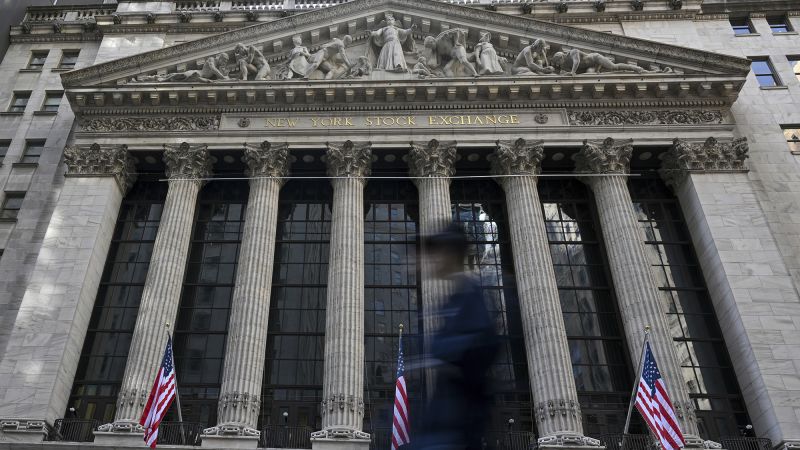The U.S. stock market displayed a mixed performance on Thursday amid various intertwining events and statements by President Donald Trump, particularly centered around ongoing trade negotiations with Europe and China. As the day unfolded, Trump made headlines by expressing his dissatisfaction with Federal Reserve Chair Jerome Powell, threatening to terminate him for not implementing interest rate cuts quickly enough, which reflects the persistent friction between the Oval Office and the Federal Reserve.
In the morning, stocks exhibited volatility as investors reacted to Trump’s inflammatory remarks directed at Powell. The president has frequently criticized Powell, highlighting a long-standing feud that adds additional layers of uncertainty to market dynamics. However, later in the afternoon, the markets appeared to regain some momentum when Trump confidently assured the media that there would “100%” be a trade deal with the European Union and described the anticipated agreement with China as a “very good deal.” This optimism resonated with investors who have been closely monitoring the progress of trade negotiations, especially during a temporary hiatus on tariffs that impact reciprocal trade.
During a press briefing held alongside Italian Prime Minister Giorgia Meloni, Trump displayed unwavering conviction about the likelihood of a trade deal, asserting that both the EU and China are eager to finalize agreements. His bold declarations came amidst concerns regarding the potential impact of his administration’s tariffs on U.S. allies and the broader global economy.
As the trading day progressed, the Dow Jones Industrial Average experienced a significant decline, closing down by 527 points, or 1.33%. Conversely, the S&P 500 managed to hold some gains, closing up 0.13% after a morning dip. The tech-heavy Nasdaq Composite faced fluctuations before ending the day down by 0.13%. This mixed overall performance followed a streak of losses from previous days, evident as all three major indexes finished the week in the red before the market closed in observance of Good Friday.
Shouldering a significant role in the Dow’s decline was UnitedHealth Group, whose shares plummeted by 22% after the company revised its profit forecast downwards. This notable drop in performance had a substantial effect given its influence on the Dow, which is weighted by share prices.
The atmosphere turned even more tumultuous when Trump took to social media to criticize Powell, stating that he was “TOO LATE AND WRONG” while labeling Powell’s recent reports as “a complete ‘mess!’” Trump’s scathing remarks not only exemplified his frustrations but also raised questions and speculations about the potential ramifications of a power shift within the Federal Reserve if he were to pursue Powell’s ouster.
Responses to Trump’s tirade were diverse. Market analysts warned of the importance of the Federal Reserve’s independence, especially given prevailing economic vulnerabilities, including inflation risks attributable to Trump’s tariffs. In a note, Krishna Guha, vice chairman at Evercore ISI, emphasized the necessity of maintaining the Fed’s independence during these times of uncertainty, indicating that any disruption could have significant economic repercussions.
Investors remained cautious as they absorbed a slew of corporate earnings reports and dealt with ongoing economic uncertainties. Major airline companies, such as United Airlines, found themselves in a precarious position, providing differing guidance reflecting recessionary scenarios versus more stable economic conditions. Capital management professionals echoed sentiments of uncertainty, acknowledging the inherent volatility in the markets while predicting ongoing swings until clearer resolutions are achieved in trade policy.
As the week closed, analysts from various financial institutions underscored the likelihood of further market turbulence until greater clarity emerges regarding tariffs and trade relationships. A forthcoming report from the International Monetary Fund (IMF) was anticipated to contain significant downward adjustments to economic growth forecasts prompted by these developments.
In reflective remarks on financial volatility, Kristalina Georgieva, the IMF’s managing director, pointed to the extreme uncertainty regarding trade policies affecting financial markets. Specifically, leading tech companies such as Alphabet and Nvidia were vulnerable to steep declines as litigation and new regulatory restrictions on exports cast long shadows over their growth trajectories.
Overall, as market participants looked ahead, the interplay between Trump’s trade policies, the Federal Reserve’s decisions, and broader economic developments continued to drive investor sentiment, likely resulting in a turbulent but pivotal period for the U.S. stock market.



